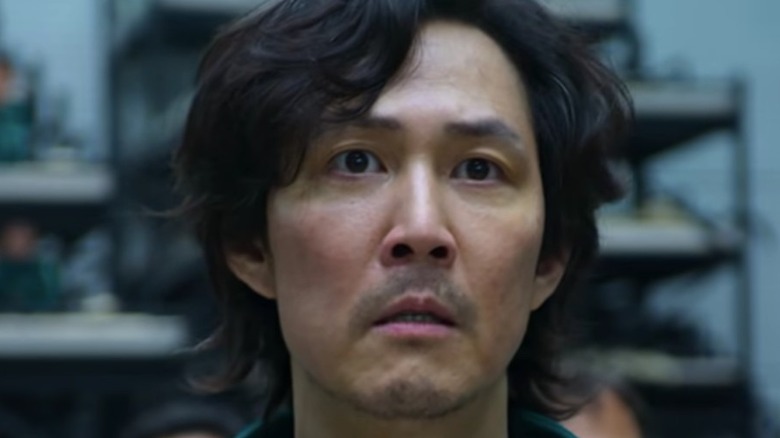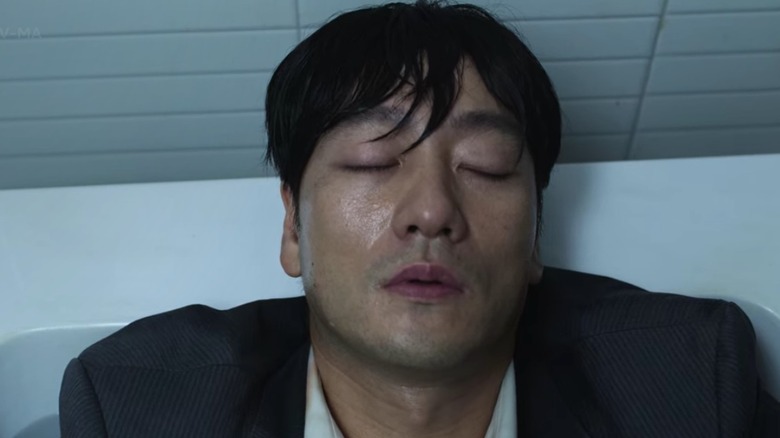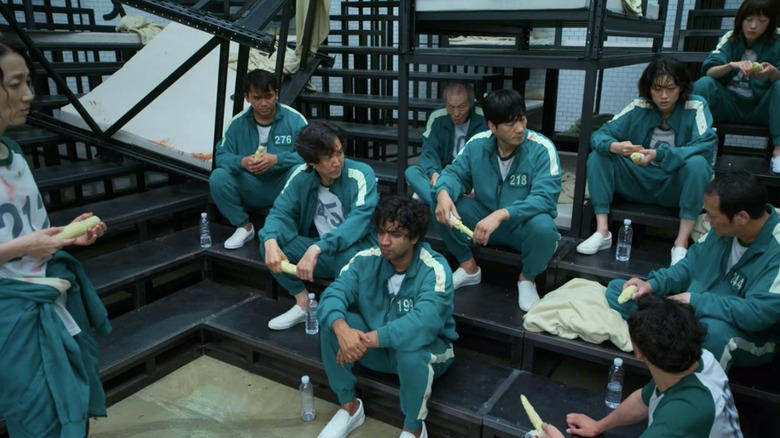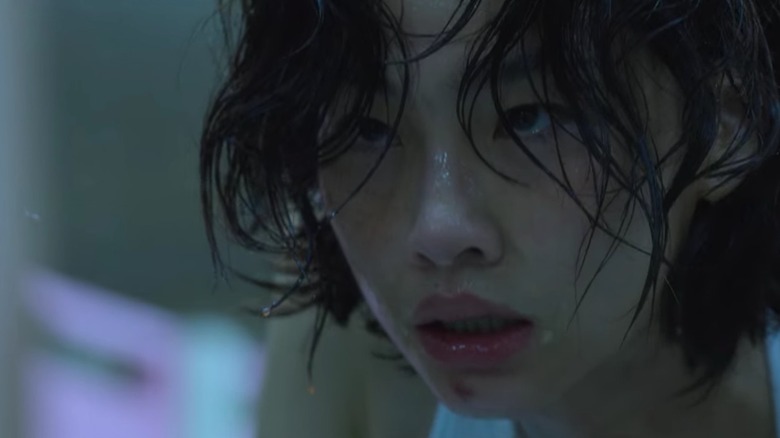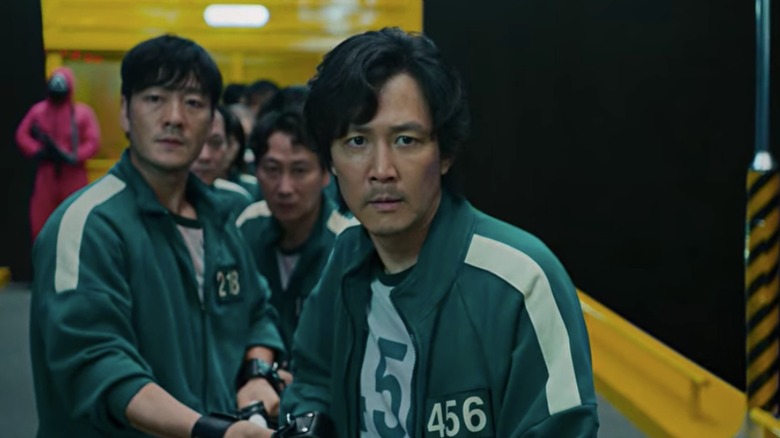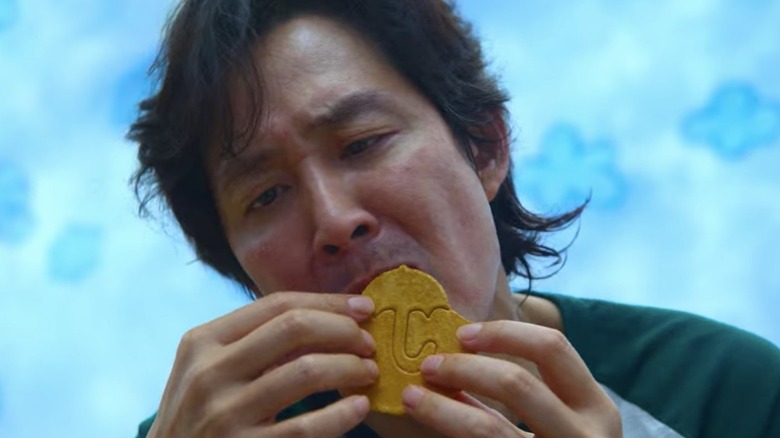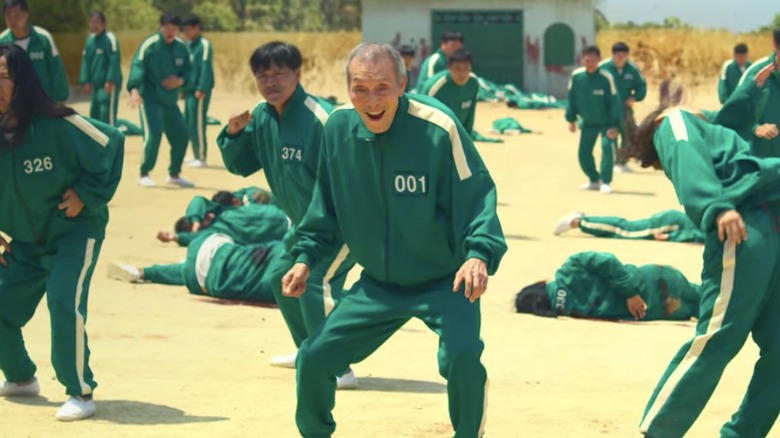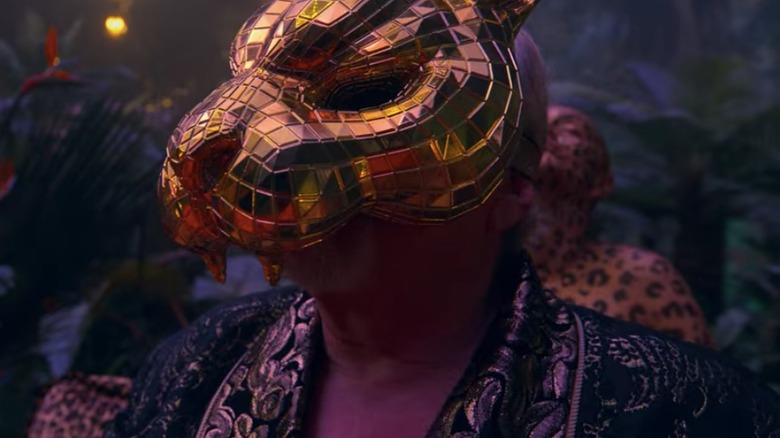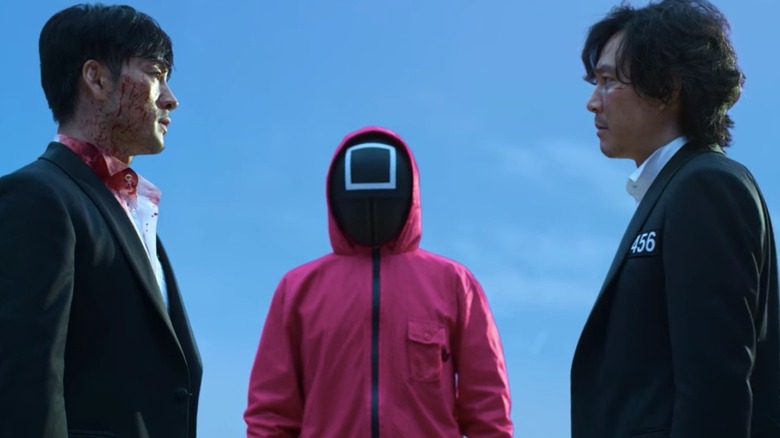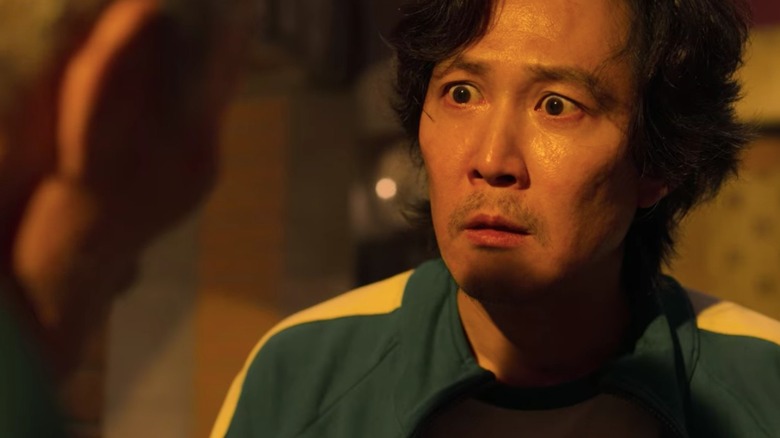Squid Game Season 1 Episodes Ranked Worst To Best
"Squid Game" was the talk of the town in 2021. Released on September 17, the survivalist drama series, written and directed by Hwang Dong-hyuk, created the sort of water cooler discussion every TV exec dreams of. According to Netflix, the show was the streaming service's most-watched series, with 1.65 billion hours of viewing over only 28 days. And for good reason: For every heart-pounding bit of action, there are character moments that make you care deeply about what will happen next.
It seems the "Squid Game" train has yet to slow down. As of this writing, the show remains in the top 10 of all non-English television shows on Netflix, a surefire sign of the series' longevity. A second season seems inevitable at this point; even Dong-hyuk admits that he has "no choice" but to continue the story, although when and how that will pan out remains to be seen. After all, it took 10 years to make the 1st season, which was originally conceived as a feature-length film.
In the meantime, we've revisited the 1st season and ranked the episodes from worst to best, based on their storylines, character development, and action. With only nine episodes, "Squid Game" kept its narrative lean and mean, giving viewers not only plenty of blood, guts, and gore but strong, heart-crushing character beats. In our ranking, we also examine how engaging the episodes are, and how they fit into the larger puzzle of the show's overall arc.
9. Hell (Episode 2)
You have to hand it to "Squid Game" for throwing a narrative curveball as early as the 2nd episode. After the pilot, you assume that the players will be immediately thrust into their next battle. Instead, they vote to quit the game entirely and return to their debt-addled lives. Since real life is far worse than any game that could be conceived, they are right back where they started; money-hungry loan sharks nip at their tails, demanding repayment of their never-ending debts. The Front Man later gives the contestants an opportunity to return, and many of them do. It all feels like such a waste.
Thematically, "Hell" (which references how the players' outside lives are literal hell) fits snuggly into the show's themes of capitalism, greed, and the limits of human nature. Subtext about mental health is woven into Sang-woo's backstory, giving the show even more gravitas. On its own, this episode is a fascinating character study about what people are willing to do in the face of poverty, and how moral lines are almost always blurred. It's a stunning glimpse into modern-day living, as we are all playing this cat and mouse game to a certain degree. However, in the context of what the first episode promises about the series to come, it could do with a bit more drive and intensity.
8. A Fair World (Episode 5)
A middling episode, "A Fair World" mostly serves to resolve the nail-biting cliffhanger from the previous episode, picking up exactly where it left off. Our heroes naturally come out victorious, but it's a gratifying conclusion anyway. The rest of the episode centers on Jun-ho, who gets caught up in a tussle with the organ harvesters, resulting in a host of masked workers being slaughtered. During his frantic escape, Jun-ho sneaks into the Front Man's office, where he discovers a storage space containing an abundance of secret files. As it turns out, his long-lost older brother was previously a contest winner.
Knowing what comes later in the series, the episode is light on narrative and action and heavy on set-up. Dominos obviously need to be put into place if they're going to fall later, but it's honestly such slow going there's not much else to enjoy.
7. Front Man (Episode 8)
Jun-ho becomes the central figure of the 8th episode. As the last remaining players enjoy a lavish banquet feast of steak and red wine, Jun-ho is on the run and finds himself backed into a corner, teetering on the edge of a cliff. The Front Man's identity is finally revealed, but it's simply not that shocking. It's a "well, duh!" moment that carries little emotional weight.
The abbreviated episode (it only lasts 32 minutes, as opposed to the show's usual hour-long runtime) acts as a stopgap between the heart-pounding bridge game and the season's big finish. Aside from the Front Man revelation, the only other notable event is Sae-byeok's tragic, totally unnecessary death scene. Upon crossing the two-panel glass bridge in "VIPS," the remaining glass panels exploded into a dazzling glass tornado. Unfortunately, a wayward fragment struck Sae-byeok in her abdomen. Her fate is all but sealed, and as she lays half-alive on her cot later that evening, the morally-bankrupt Sang-woo finishes her off by slitting her throat. If "Gangbu" wasn't devastating enough, "Front Man" goes in for the final kill.
6. Stick to the Team (Episode 4)
Shows like "The Walking Dead" have overused cliffhangers to keep their audiences engaged in the storyline. Fortunately, that's not the case with "Squid Game," which only uses a cliffhanger in this one episode. Its effectiveness comes from placing the cliffhanger right in the middle of a game of tug-of-war. Gi-hun and his comrades, including Sang-woo, Ali, and Sae-byeok, nearly tumble to their deaths, but in a last-ditch effort, they pull off a trick: taking three huge steps forward to knock their opponents off-balance. It works, and we're left with one of the greatest cliffhangers of all time. It's simply a genius move.
The audience gets a glimpse behind the curtain, as well. After only receiving a single egg and a bottle of water for dinner, the players are none too happy, and a riot breaks out during the night. Senseless bloodshed follows, as does the admission that depriving the contestants of food is part of a grander scheme to make the players turn on one another. As it turns out, people will perform some dark deeds when they're hungry.
5. The Man with the Umbrella (Episode 3)
Where "Red Light, Green Light" established the high-stakes nature of the game, "The Man with the Umbrella" pulls back on the reins a little bit. There's still plenty of carnage, but the tension hangs thick in the air as the competitors must carve out various shapes from honeycombs using a needle. There's only one rule: The shape must be extracted without breaking. Seemingly, the players are allowed to use whatever means necessary. Gi-hun licks the back of his honeycomb, for example, and Mi-nyeo secretly uses a lighter to heat up her needle,.
The episode gives the audience a chance to settle into the story while furthering the desperation and the dilemma that the players face. It's not exactly the most thrilling sequence, but it's engaging with its subtle character work. Gi-hun's palpable distress contrasts sharply with Oh-Ilnam's more even-tempered demeanor as he chisels away effortlessly on his honeycomb. It's only when the buzzer finally rings, and a slew of players are mowed down, that you can breathe. That's what effective storytelling is all about.
4. Red Light, Green Light (Episode 1)
There aren't many debut episodes as relentless as "Red Light, Green Light." Few viewers knew exactly what they were in for with "Squid Game," and goodness, the premiere was a violent and maybe even cruel crash course in what the show is all about. At the beginning, we're introduced to Gi-hun, and the story appears to be told through his eyes as we learn about his gambling addiction before he decides to take a sharp-dressed man (Gong Yoo) up on his offer to play a game for money. He's so desperate that he'll do literally anything to help his ailing mother.
Upon arriving on an unknown island, we learn there are 456 players who will be competing for the grand prize: 45.6 billion won. Red Light, Green Light, a game in which one person has their back turned (signifying green light) and then does a 180 to catch the other players in motion (red light), becomes a matter of life and death. Even if we aren't quite invested in the characters yet, the tension and the emotional currents rumbling beneath are more than enough to get us to watch the next episode.
3. VIPS (Episode 7)
The show needed a generous dose of levity following "Gangbu," and "VIPS" largely delivered. As the competition progressed, "Squid Game" had been teasing so-called VIPs, a group of social elites who enjoy watching the events from the comfort of their homes. In this episode, their identities are (sort of) revealed 一 but all that we really know about them is that they're mostly American and British (as they speak English) and that they hide their faces behind gilded, gem-encrusted animal masks. They've placed bets all competition long, and now they want returns on their investments.
When Jun-ho infiltrates the servant's quarters, posing as a whiskey-pouring waiter, he is sexually propositioned by one of the masked VIPs. Of course, he flips the script and manages to hold the unnamed man at gunpoint, demanding that the VIP give him all the information he knows about the competition.
Meanwhile, a game involving a two-panel glass bridge is well underway. It's one of the show's most suspenseful sequences, with the players trying their hand at hopping across the bridge upon one of two panels. It's essentially a game of "Frogger," but instead of becoming roadkill, they go splat like bugs on a windshield. Not only is it extremely entertaining, but it's an easy way to narrow the field from 16 players to only three.
2. One Lucky Day (Episode 9)
"One Lucky Day" does what all the greatest season finales should do: tie up loose ends and present new obstacles and storylines for the next season. In the final matchup, Sang-woo and Gi-hun combat each other in Squid Game, a callback to the show's opening flashback sequence. Where episode 6 "Gangbu" (more on that below) served as the show's emotional tipping point, "One Lucky Day" delivers a second wave of punches, including the death of Gi-hun's mother. Even for the audience, it's a true test of emotional and physical will. The characters have already endured and done so much. Are they willing to go even further?
The game itself is of no real concern, as it soon devolves into a hand-to-hand duel to the death. In cinematic fashion, it begins to rain, a creative choice that gives the scene even more intensity. Neither player has anything left to lose, so all bets are off. The fight sequences are messy but completely realistic — and that's the point, as neither combatant knows how to fight properly. The payoff comes when Sang-woo stabs himself in the throat, a moment that's as satisfying as it is heartbreaking. Regardless of your feelings for him, Gi-hun still cares deeply for his childhood friend. There's something to be said for his willingness to see past one's sins and embrace who they are in their most vulnerable state.
1. Gangbu (Episode 6)
Capitalism, greed, and sacrifice lie at the heart of "Squid Game." In the show's defining episode, aptly titled "Gangbu" (which loosely translates to "best friends"), our protagonists must compromise their integrity and throw someone else under the bus. In a game of marbles, the remaining players are divided into teams of two, and one contestant must win all the marbles from their competitor. It doesn't matter how they win, as long as no violence is used in order to do so.
It's a bit of storytelling tomfoolery; the players have no idea that they will be competing against one another until they're each handed a bag of marbles. The teams — including Sang-Woo and Ali, Sae-beyok and Ji-yeong, and Oh-Ilnam and Gi-hun — can play any marble-based game they want. What results is one of the most gripping, emotionally-pulverizing episodes of TV ever created. Sang-Woo manipulates Ali into handing over his bag of marbles, whereas Gi-hun exploits Oh-Ilnam's fleeting memory (or so he thinks) to win. The show posits that what you do under the most insurmountable circumstances defines who you are as a person. Would you rather die as a good person? Or are you capable of lying if it means that someone else pays the price?
